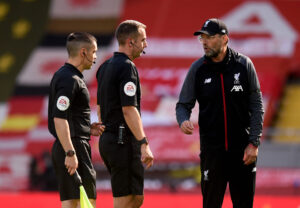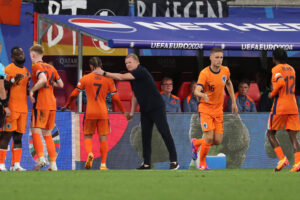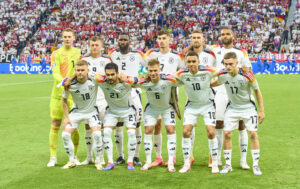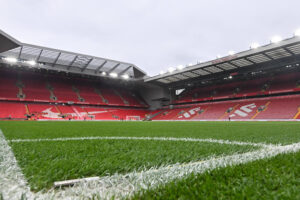Even in the international break, the feelgood factor continues to build at Arsenal. Of course, that is principally because of the transfer deadline day signing of Thomas Partey from Atletico Madrid. The Ghanaian midfielder had long been sought after by Mikel Arteta and he finally joined the Gunners for what was by some distance the biggest fee paid at the end of the transfer window.
Atletico might have felt annoyed that Arsenal had effectively by-passed them by meeting Partey’s buyout clause of £45 million, but that in itself was another testament to the truly new Arsenal that is emerging under Arteta. Finally, for the first time in a very long time (arguably since the early years of Arsène Wenger), the club are exhibiting the necessary decisiveness, perhaps even ruthlessness, in the transfer market.
The challenge now for both Partey and Arteta is to make sure that he settles in at Arsenal as quickly as possible and then starts to reproduce the impressive form at Atletico that had first alerted Arteta to him. Although the Ghanaian might lack the flair and creativity of Houssem Aouar, Arsenal’s other major transfer target who eventually decided to stay at Lyon, he should bring the defensive solidity and sheer midfield leadership – even midfield generalship – that has really been lacking at Arsenal ever since Patrick Vieira left the club 15 years ago.
Nevertheless, Partey will have to go some to match the impact at Arsenal of other major midfielders signed in the past. Here, then, are five famous Arsenal midfield signings.
Famous Arsenal Midfield Signings
5. Mikel Arteta (Joined From Everton in 2011)
Arsenal’s manager might be a surprise inclusion in this list, and to some extent, that sense of surprise is justified. Although Arteta was signed from Everton for £10 million in the summer of 2011 as a last-minute replacement for the Barcelona-bound Cesc Fabregas, he never really matched the on-field influence of the departing Catalan, not least because of the injuries that eventually ended his playing career.
However, the real influence of Arteta at Arsenal was always felt off the pitch, as if from the very beginning he was training and positioning himself to be Arsène Wenger’s eventual replacement as manager. And although he certainly didn’t need it, especially after his impressive FA Cup-winning start to his time as Arsenal manager, Arteta effectively received the blessing of the man he eventually replaced (after Arsenal’s disastrous dalliance with Unai Emery) earlier this week. That was when Wenger’s biography, My Life In Red and White, was serialised in The Times and Wenger wrote of the Spaniard: “Every club has a culture that can be momentarily forgotten but it always resurfaces. Mikel Arteta took charge of the team in December 2019, and with him these values, this spirit, this style that was characteristic of the club can once again come to the fore.”
Overlooking the fact that Arsenal’s “culture” was not “momentarily forgotten” under Wenger in his last decade in charge but virtually lost forever, this was still an impressive endorsement of the man who really is leading Arsenal, at last, into a new age.
4. Aaron Ramsey (Joined From Cardiff City in 2008)
When Aaron Ramsey left Arsenal last year to join Juventus on a free transfer, in what was another classic example of Arsenal’s appalling contract management under Wenger at the end of his tenure and under Emery throughout his entire time in charge, most Arsenal fans did not appear particularly upset. And the fact that, since joining Juventus, Ramsey has barely played (largely, it has to be said, because of injury) has only furthered the impression that he was not really a great player at all, but merely a very good one.
However, that would be to overlook Ramsey’s absolutely vital contribution to the three FA Cup wins that marked the end of Wenger’s time in charge and finally returned the club to trophy-winning glory after nearly a decade (nine years in fact, between 2005 and 2014) without any silverware at all. In fact, in the entire history of Arsenal, Ramsey is the only player to score two winners in major finals.
The first, against Hull City in the FA Cup final in 2014, came at the end of what was undoubtedly the Welshman’s best season at the club when he finally showed that he had recovered from what was nearly a career-ending leg-break by Stoke City’s Ryan Shawcross in 2010. And the second, against Chelsea in the FA Cup final in 2017, effectively marked the last hurrah for Wenger at Arsenal, as Ramsey’s header from Olivier Giroud’s cross (and it had been the French striker who had also set up Ramsey’s winner against Hull three years earlier) sealed a truly surprising victory over the then Premier League Champions.
3. Gilberto Silva (Joined From Atletico Mineiro in 2002)
There is still much debate among Arsenal fans (especially the older ones, who remember the club winning leagues and not just cups) about who the best midfield partner for Patrick Vieira was. The truth was that the great Frenchman had two superb midfield partners during his time with the Gunners, both of whom also won the World Cup, just to prove their gold-standard class. In the end, however, Gilberto Silva just edges Emmanuel Petit, Vieira’s original compadre in the centre of the pitch at Arsenal, for the simple reason that they won more with Vieira and Silva in midfield than they did with Vieira and Petit.
When he joined Arsenal in the summer of 2002, Gilberto (like most Brazilians, he tended to be known by just the one name) completed a meteoric rise to the top of international and club football. He had broken through at international level earlier that summer when he had been a last-minute addition to the Brazil team of Luiz Felipe Scolari, following a late injury to the first-choice central midfielder, Emerson. But Silva seized his chance with aplomb, providing the midfield ballast and stability to counter-balance the glorious attacking trident of Ronaldo, Ronaldinho and Rivaldo.
Gilberto’s role in the team at Arsenal was virtually identical. Although he scored on his debut against Liverpool in the Charity Shield, he was essentially the defensive glue that held the otherwise entirely attack-minded Arsenal midfield together. Certainly, with the brilliant Brazilian behind him, Vieira was freed from being a primarily defensive midfielder and the result was Wenger’s true golden era at the club, as Arsenal won the Premier League in the Invincibles season of 2003-04 and two FA Cups in the three years that Silva and Vieira were the bedrock of the Arsenal midfield.
2. Patrick Vieira (Joined From AC Milan in 1996)
Arsène Wenger was such a fan of Patrick Vieira that he signed the young Frenchman before he had fully taken charge at the club, instructing David Dein (who for the first decade that Wenger was at Arsenal was truly his right-hand man) to push through the signing of Vieira from AC Milan. And there is no doubt that Vieira’s arrival at the club was absolutely instrumental in winning over the fans before Wenger had even arrived from Japan, where he was completing his time with Nagoya Grampus Eight.
As Arsenal legend has it, many fans had been upset that the club had not signed Jason McAteer instead of Vieira, but Wenger and Vieira soon proved them wrong. And they continued to prove them wrong as the great French midfielder – and he truly was a great midfielder, combining defensive steel with sublime attacking instincts – was at the absolute heart of Wenger’s first, fantastic decade at the club.
The only shame about Vieira’s time at Arsenal was the manner of his leaving. Having just scored the decisive winning penalty against Manchester United in the 2005 FA Cup final, he was abruptly shown the door by being sold to Juventus and returning to Italy. Initially, there seemed some merit in the move, further proof that, as Arsenal fans said in hushed whispers at the time, “Arsène knows”. And that view appeared to be borne out when Vieira’s replacement, Cesc Fabregas, had by far the better of their midfield battle when Arsenal defeated Juventus en route to the 2006 Champions League Final.
In retrospect, however, the decision to move Vieira on so swiftly and perhaps even mercilessly was the beginning of the long rot that set in during Wenger’s second decade at the club. It is only now, a decade and a half later, that Arsenal have signed another African-born central midfield star (as the famous song about Vieira declared, “He comes from Senegal/He plays for Arsenal”) in Partey, who might just be the basis of another Championship-contending team in the years ahead.
1. Alex James (Signed From Preston North End in 1929)
There are two contenders, from very different and historically separate eras, for the title of Arsenal’s Most Important Signing Ever. In the modern era (so, post-1971, when Arsenal finally won not one but two trophies after nearly 20 years of not winning anything), it is definitely Dennis Bergkamp. The signing of the mercurial Dutchman completely transformed Arsenal’s standing within both English and European football, and even more importantly transformed the playing style of the club, from the fairly dour and functional football of George Graham’s best sides to the dazzling attacking flair and skill of Arsène Wenger’s best sides. And the irony is, of course, that neither man signed him for Arsenal. Instead, it was Bruce Rioch, who single-handedly justified his single year in charge at Arsenal by overseeing the signing of the non-flying Dutchman. (If Bergkamp had been able to take to the air, and therefore appear in more away matches in the Champions League, Wenger’s Arsenal might just have won the Champions League after all.)
However, even Bergkamp has to take second place in the all-time list of Arsenal signings to Alex James, the man whose signature on an Arsenal contract completely and utterly changed the history of the club. Arguably, James was even more important to Arsenal than the man who signed him, Herbert Chapman, because Chapman had already been in charge at Arsenal for four years, during which time he had won nothing when James joined. That trophy drought, which in fact covered the entire history of the club since its formation in 1886, ended almost as soon as the one-time Wembley Wizard (James had been part of the great Scotland team that had demolished England 5-1 at home in 1928, nearly three decades before the Mighty Magyars of Puskas et al repeated the feat) joined the club.
In James’s very first season, Arsenal won their very first trophy – the 1930 FA Cup – and they did not look back for the rest of the decade as they became the first club in the 20th century to really dominate English football, including winning a hat-trick of league titles between 1933 and 1935. The fact that Arsenal have never won even two league titles in succession since then is perhaps the ultimate testament to the skilful, scheming brilliance of Arsenal’s original and still greatest ever Scot.
Main Photo






